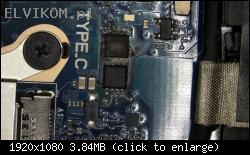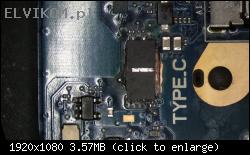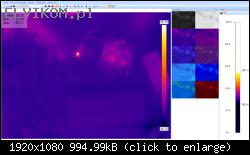#1 Lenovo IdeaPad 5Pro-16IHU6 - Grzejące się tranzystory QT6201 i QT6202
by pawel5196 • 29 August 2025, 14:11
Witam.
Laptop - Lenovo IdeaPad 5Pro-16IHU6
Płyta główna - nb3036_mb_v4
Wypalone PCB oraz uszkodzone mosfety QT6201 i QT6202. Według schematu siedzą tam PE5E4BA oraz PE5E6BA. Brak dostępności w PL. Zamówiłem AON7318. Wstawiłem zamiast oryginalnych.
Płyta uruchamia się, lecz oba tranzystory bardzo mocno się nagrzewają.
Napięcia:
QT6202:
n1,2,3 - 20V
n4 - 20.5V
n5 - 19.4V
QT6201:
n1,2,3 - 19.4V
n4 - 20.5V
n5 - 18.2V
Spotkał się ktoś z takim problemem? Czy może trzeba wstawić identyczne tranzystory jak były?
Z góry dzięki za pomoc.
EDIT:
Jak dobrze sądzę, problemem może być sterowanie bramkami traznsytorów. Za niskie napiecie. Sygnay idą do TPS65994A. Dobrze myślę?



Laptop - Lenovo IdeaPad 5Pro-16IHU6
Płyta główna - nb3036_mb_v4
Wypalone PCB oraz uszkodzone mosfety QT6201 i QT6202. Według schematu siedzą tam PE5E4BA oraz PE5E6BA. Brak dostępności w PL. Zamówiłem AON7318. Wstawiłem zamiast oryginalnych.
Płyta uruchamia się, lecz oba tranzystory bardzo mocno się nagrzewają.
Napięcia:
QT6202:
n1,2,3 - 20V
n4 - 20.5V
n5 - 19.4V
QT6201:
n1,2,3 - 19.4V
n4 - 20.5V
n5 - 18.2V
Spotkał się ktoś z takim problemem? Czy może trzeba wstawić identyczne tranzystory jak były?
Z góry dzięki za pomoc.
EDIT:
Jak dobrze sądzę, problemem może być sterowanie bramkami traznsytorów. Za niskie napiecie. Sygnay idą do TPS65994A. Dobrze myślę?





